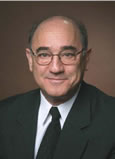Alexander Pines

Hubert M. James Lecture
April 1, 2010Alexander Pines is the Glenn T. Seaborg Professor of Chemistry at the University of California, Berkeley, Senior Scientist in the Materials Sciences Division of the Lawrence Berkeley National Laboratory (LBNL), and a Faculty Affiliate at QB3-the California Institute of Quantitative Biomedical Research. He was born in 1945, grew up in Rhodesia (now Zimbabwe) and studied undergraduate mathematics and chemistry in Israel. Coming to the United States in 1968, Pines obtained his Ph.D. in chemical physics at M.I.T. in 1972 and joined the Berkeley faculty later that year.
Among his many prestigious awards and honors, Pines has received the Langmuir Medal of the American Chemical Society, the Faraday Medal of the Royal Society of Chemistry, the Wolf Prize for Chemistry (together with Richard R. Ernst) in 1991 and in 2008, the European Magnetic Resonance Society Russell Varian Prize. A renowned educator, Pines has also been recognized by numerous teaching honors, including the University of California’s Distinguished Teaching Award. He is a member of the U.S. National Academy of Sciences, the American Academy of Arts and Sciences and a Foreign Member of the Royal Society (London); he is Doctor Honoris Causa at the University of Paris and the University of Rome, and past President of the International Society of Magnetic Resonance.
"Some recent developments in unconventional NMR and MRI"
Abstract: Developments in NMR and MRI that seek to avoid high-field immobile superconducting magnets by using ultralow magnetic fields and novel methods of polarization and detection will be described. Examples include /ex situ /mobile spectroscopy and imaging, laser polarization of noble gases, para-hydrogen polarization, superconducting quantum interference detection, laser atomic magnetometry and remote detection. Illustrative applications include laser polarized molecular biosensors, zero-field spectroscopy, and microfluidic imaging. It is anticipated that such developments will contribute to the possibility of targeted molecular MRI and lab-on-a-chip NMR and MRI in physics, chemistry and biomedicine.
- Events and Seminars
- Astrophysics Seminars
- Biophysical Seminars
- Condensed Matter Seminars
- Nuclear Physics Seminars
- Physics Education Research Seminars
- Events and Seminars Archives
- General Colloquia
- Hubert M. James Lectures
- Particle Physics
- Candidate Seminars
- Atomic, Molecular, Optical Seminars
- Quantum Informational Science
- Nuclear Physics Seminar